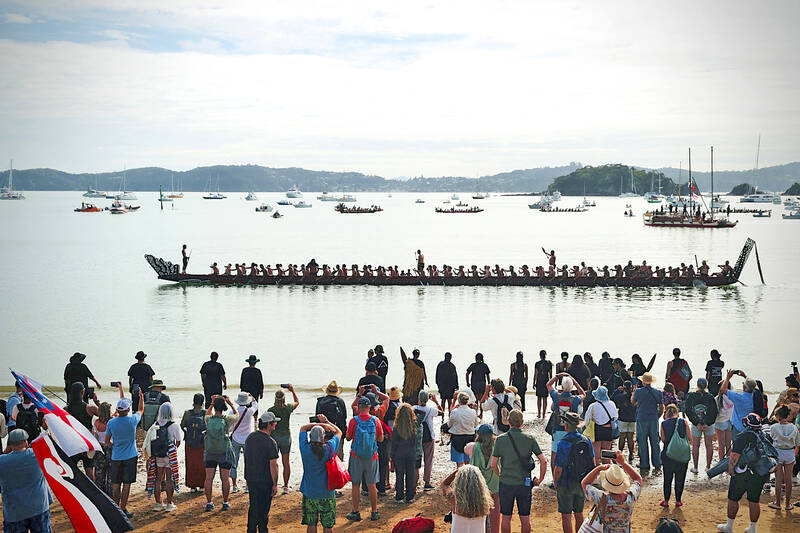Thousands gathered across New Zealand yesterday to celebrate the signing of the country’s founding document and some called for an end to government policies that critics say erode the rights promised to the indigenous Maori population.
As the sun rose on the dawn service at Waitangi where the Treaty of Waitangi was first signed between the British Crown and Maori chiefs in 1840, some community leaders called on the government to honor promises made 185 years ago.
The call was repeated at peaceful rallies that drew several hundred people later in the day.

Photo: AP
“This government is attacking tangata whenua [indigenous people] on all fronts. Rolling back Maori representation, undermining our reo [language], our tikanga [customs], our tino rangatiratanga [self-determination],” Anaru Ryall, an activist with Tiriti Action Group Poneke, told the protest in the capital, Wellington.
Relations between the government and Maori have soured in the past 18 months, and some government ministers faced protests as they tried to address crowds in Waitangi on Wednesday.
The conservative government, elected in late 2023, has unwound policies and disbanded organizations aimed at improving the lives of Maori, who make up about 20 percent of the 5.3 million population.
Maori have higher levels of deprivation and incarceration, and worse health outcomes than the broader population.
The annual Waitangi Day celebrations, which also included free concerts, sporting events and panel debates, have long been used as a time of protest.
New Zealand Prime Minister Christopher Luxon of the New Zealand National Party spent the day with the Ngai Tahu people in the South Island, avoiding Waitangi where protesters heckled ministers last year. He said he wanted to celebrate with other people who had signed the treaty.
“Today is a time to reflect on where we have come from and look forward to where we are going together as a nation,” Luxon wrote on X.
In late last year, tens of thousands of New Zealanders took part in a nine-day march against the Treaty Principles Bill. The bill, which looks unlikely to secure enough support to become law, seeks to redefine how the treaty is interpreted.
The bill has been championed by the libertarian ACT Party, which agreed to support the National Party providing the law was introduced to parliament. It is currently being discussed by a parliamentary committee.
A record 300,000 submissions were made on the bill and hours of oral submissions are being worked through.
At the march in Wellington, Kahu Unahi said she was there to stand up for the rights of her family, her people and for her ancestors who fought to improve the plight of Maori.
“We have to keep representing tangata whenua [indigenous people],” the 39-year-old said.

South Korea would soon no longer be one of the few countries where Google Maps does not work properly, after its security-conscious government reversed a two-decade stance to approve the export of high-precision map data to overseas servers. The approval was made “on the condition that strict security requirements are met,” the South Korean Ministry of Land, Infrastructure and Transport said. Those conditions include blurring military and other sensitive security-related facilities, as well as restricting longitude and latitude coordinates for South Korean territory on products such as Google Maps and Google Earth, it said. The decision is expected to hurt Naver and Kakao

THE TRAGEDY OF PUNCH: Footage of the seven-month-old Japanese macaque has gone viral online after he was rejected by his mother and formed a bond with a soft toy A baby monkey in Japan has captured hearts around the world after videos of him being bullied by other monkeys and rejected by his mother went viral last week. Punch, a Japanese macaque, was born in July last year at Ichikawa City Zoo. He has drawn international attention after zookeepers gave him a stuffed orangutan toy after he was abandoned by his mother. Without maternal guidance to help him integrate, Punch has turned to the toy for comfort. He has been filmed multiple times being dragged and chased by older Japanese macaques inside the enclosure. Early clips showed him wandering alone with

MONEY GRAB: People were rushing to collect bills scattered on the ground after the plane transporting money crashed, which an official said hindered rescue efforts A cargo plane carrying money on Friday crashed near Bolivia’s capital, damaging about a dozen vehicles on highway, scattering bills on the ground and leaving at least 15 people dead and others injured, an official said. Bolivian Minister of Defense Marcelo Salinas said the Hercules C-130 plane was transporting newly printed Bolivian currency when it “landed and veered off the runway” at an airport in El Alto, a city adjacent to La Paz, before ending up in a nearby field. Firefighters managed to put out the flames that engulfed the aircraft. Fire chief Pavel Tovar said at least 15 people died, but

Australian Prime Minister Anthony Albanese yesterday said he did not take his security for granted, after he was evacuated from his residence for several hours following a bomb threat sent to a Chinese dance group. Albanese was evacuated from his Canberra residence late on Tuesday following the threat, and returned a few hours later after nothing suspicious was found. The bomb scare was among several e-mails threatening Albanese sent to a representative of Shen Yun, a classical Chinese dance troupe banned in China that is due to perform in Australia this month, a spokesperson for the group said in a statement. The e-mail